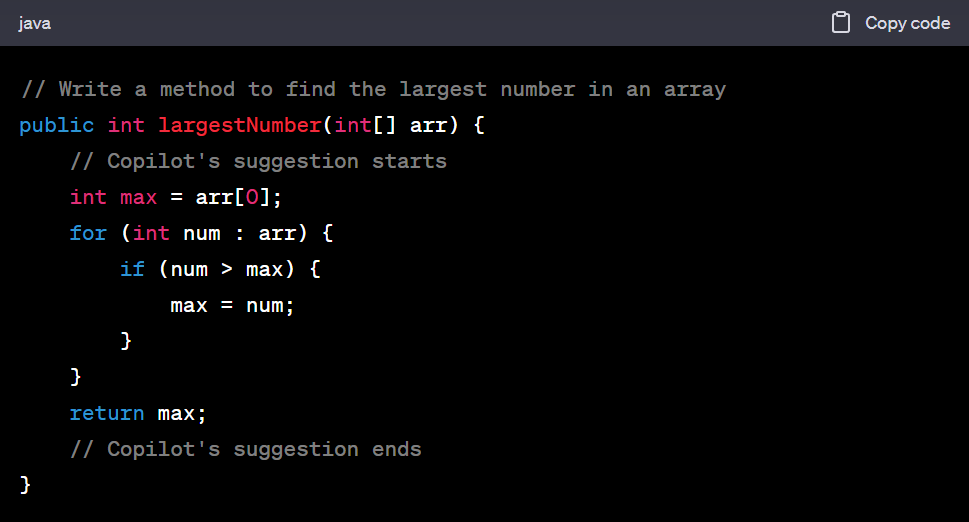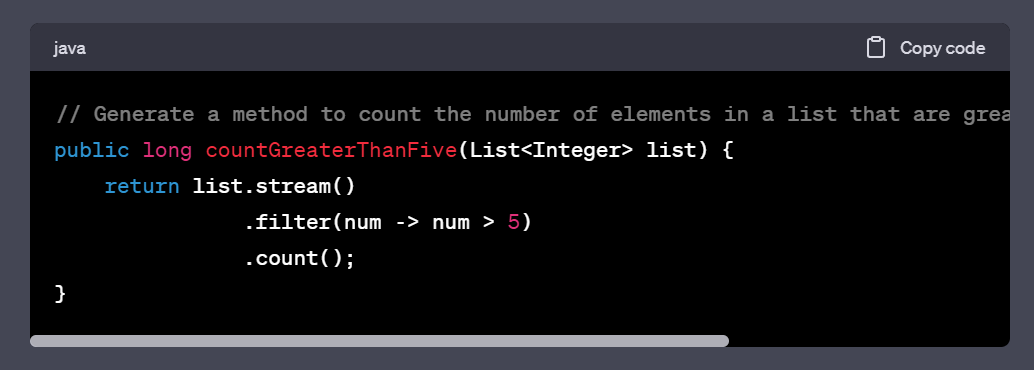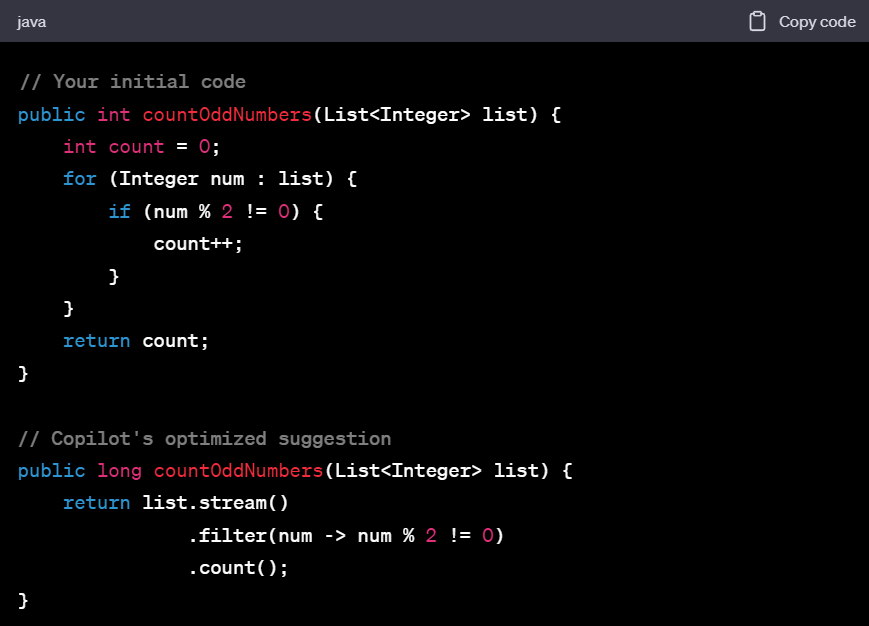- Engineering
- 6 min read
- July 2023
11 Top Tips and Tricks of Copilot for Java Developers
In the rapidly evolving realm of software development, developers are perpetually seeking tools that enhance efficiency, automate mundane tasks, and provide intelligent assistance. One tool that has ascended to become an invaluable ally for programmers globally is GitHub Copilot, a remarkable tool powered by AI, offering coding assistance par excellence.
What is GitHub Copilot?
GitHub Copilot serves as your AI pair programmer, supporting developers as they navigate the complex landscape of programming languages. Launched in 2021, this revolutionary tool is a result of a collaboration between GitHub and OpenAI.
Unlike conventional code editors or IDEs, GitHub Copilot goes beyond being a mere tool. It acts as a partner, generating, completing, and refining code based on your comments and the existing code. It provides contextually aware suggestions, making it an invaluable asset in the coding process.
How does Copilot work?
GitHub Copilot is powered by Codex, a new AI system developed by OpenAI, the innovative minds behind GPT. Codex is a large-scale machine learning system trained on many public code repositories, enabling it to predict and provide various potential code solutions for a given problem.
Through analyzing and learning from billions of lines of code, it proposes code that aligns with your inputs, ultimately rendering the coding process more streamlined and efficient.
Why should Java developers consider using GitHub Copilot?
Java, being one of the most popular programming languages globally, offers a vast repository of existing code. GitHub Copilot can tap into this wealth of knowledge and provide relevant code suggestions, helping Java developers write cleaner and more efficient code. It is particularly valuable when working with Java's object-oriented paradigms, as Copilot's contextual understanding can assist in navigating Java's extensive library ecosystem. It's like having an experienced Java developer by your side, simplifying the coding process and facilitating continuous learning.
Now, let's explore the practical aspects of using GitHub Copilot for Java development. The following sections present 11 valuable tips and tricks that can help you leverage the power of this AI-powered coding assistant and optimize your Java development workflow.
11 top tips and tricks of Copilot for Java developers
Venturing into the realm of software development requires a well-honed toolkit to navigate the intricate labyrinth of code. One such indispensable tool is GitHub Copilot, an AI-powered assistant designed to revolutionize your coding experience. For Java developers, this means accessing a wealth of knowledge, advice, and automation that can substantially elevate your productivity and efficiency. Here are 11 workable tips to help turbocharge your Java development with GitHub Copilot:
1. Use Copilot to generate code
GitHub Copilot goes beyond the assistance provided by standard IDEs. Powered by AI, it can generate new code snippets based on your instructions. Whether you need to implement a new method, create a class, or build an entire program, Copilot is an ideal starting point.
To make the most of GitHub Copilot's code generation feature, ensure your comments are clear and explicit. For example, if you want to generate a method to sort a list of integers in ascending order, simply type "// Generate a method to sort a list of integers in ascending order," and Copilot will provide a fitting code snippet. The more context you provide, the more accurate and useful the generated code will be.

2. Use Copilot to complete code
When you find yourself stuck in the middle of writing a complex function or method, GitHub Copilot can be your savior. It leverages the context of your current code and offers suggestions to complete it. For instance, if you're working on a method to find the largest number in an array and have already set up the structure but need help with the logic, Copilot can fill in the gaps.

3. Use Copilot to refactor code
Code refactoring – restructuring existing code without changing its functionality – is a critical aspect of software development. Copilot can offer different ways to refactor your code, making it more readable and maintainable. Whether it's recommending a switch from traditional for-loops to enhanced loops or suggesting more efficient ways to handle exceptions, Copilot is there to help.
4. Use Copilot to debug code
Debugging is a tedious but unavoidable aspect of coding. With Copilot, you can expedite this process. By analyzing your code's syntax and structure, it can suggest potential fixes for your errors. For instance, it could offer a null check to handle a NullPointerException you might have missed.
5. Use Copilot to document code
Good documentation is vital for maintaining the understandability and longevity of your code. Copilot can help by generating insightful and accurate comments, ensuring your code is easily understood by others (or even by yourself, months later).
For example, for the largest Number method above, Copilot might suggest a comment like // Method to find the largest number in an array.
6. Use Copilot to find code
Searching your codebase for specific pieces of code can be daunting, especially in large projects. Typing the functionality you are looking for as a comment, Copilot can provide you with code suggestions matching your requirements.
7. Use Copilot to Learn New Java Features
Learning new features in a programming language can be challenging. GitHub Copilot is a real-time tutor that provides relevant code snippets that use newer Java features. You're unfamiliar with Java Streams but must use it in your project. Type a descriptive comment, and Copilot can suggest a code snippet utilizing Java Streams.

8. Use Copilot to Collaborate with Others
In collaborative projects, maintaining coding style and practice consistency is essential. GitHub Copilot analyzes the existing codebase and provides suggestions in line with the project's coding style and practices. This feature ensures a cohesive code structure, regardless of the number of contributors.
9. Use Copilot to Improve Your Productivity
Copilot dramatically enhances your productivity by auto-generating code, completing lines, refactoring, debugging, and creating documentation. It handles routine tasks so you can focus on complex problem-solving and strategic planning.
10. Use Copilot to Improve Your Code Quality
Copilot's suggestions adhere to best coding practices, thereby improving the overall quality of your code. It helps avoid common mistakes and ensures your code is efficient, clean, and bug-free. For instance, it can suggest more optimized versions of your code, as shown below:

11. Use Copilot to Stay Up-to-date with Java Standards
The world of Java is continually evolving, and keeping abreast of the latest standards can be a formidable task. With Copilot, you can align your code with the newest standards by suggesting the use of new features and practices.
By implementing these strategies, you can tap into GitHub Copilot's potential, transforming your Java development journey into a more productive and less daunting experience. As the future of AI unfolds, tools like Copilot will become even more integral in the developer toolkit, introducing more sophisticated code suggestions and tackling complex tasks.
Seize the future of development: Embrace GitHub Copilot with Rapidops
Harness the power of GitHub Copilot to revolutionize your Java development process, boosting productivity and code quality. Rapidops is committed to integrating such transformative innovations into digital product development, fostering continuous learning and innovation. Contact us today to explore how our expertise and innovative approaches can accelerate your digital transformation journey and help you achieve your business goals.
Frequently asked questions about Github copilot
Now, let’s address some commonly asked questions about GitHub Copilot. Whether you’re curious about its compatibility with different programming languages or concerned about the security of your code, we’ve got you covered with answers to the most frequently asked questions.
How can I start using GitHub Copilot?
Does GitHub Copilot have access to my private code?
Is GitHub Copilot secure?




